- Home
- Lionel Shriver
Should We Stay or Should We Go Page 2
Should We Stay or Should We Go Read online
Page 2
“May I finish, oh salt of the earth?” Kay said. “In the mid-1930s the economy was still crap. And of course my mother was flattered by an older man’s attentions. I think she did truly fall for him, but in that overawed way you get infatuated with an imposing professional who’s your boss. He represented a port in the storm. The eighteen-year age difference must have seemed more an advantage than a sacrifice.”
“Young people have no imagination,” Cyril said.
“Exactly,” Kay said. “She might have considered the consequences for their children—since for Percy and me, our father always seemed like an old man; little did we know how young he still was. Our classmates’ fathers had all fought in ‘the war,’ and we tended to conceal the fact that ours had fought in the other one. Still, the last thing my mother would have calculated at her wedding is that when her groom turned eighty, she’d be only sixty-two, looking right smart for a woman getting on, and stuck with a basket case who suddenly can’t remember who’s prime minister. And since almost no one lived terribly long in the thirties, the very, very last thing my mother would have calculated is that when he finally died at ninety-flipping-four, she’d be seventy-six, with bad hips, after having squandered a decade and a half on toilet duty, cursed and vilified for her efforts, mind you—only to be looking at the next tranche of her life and wondering if the same thing is about to happen to her!”
“I’m not accusing you of being self-centred,” Cyril said gently, touching her hand. “But are you crying for your mother, or for you and me?”
“Oh, I have no idea,” Kay said, wiping her eyes, on this day of all days relieved to be crying over someone, if only herself.
“Are you by any chance also angry at me?” Cyril asked tentatively. “For not covering for you more often, with your father?”
“No, no, we’ve talked about this. Please stop castigating yourself. One of us had to be here for Hayley whilst she was still in school, and someone had to remember to pick up a loaf of bread. You surely remember that those few times you relieved me my father got dreadfully agitated. Maybe he perceived you as a rival for Adelaide’s affections. Besides, you run up to Birmingham to check on your own ageing parents practically every month. And who knows what will happen to my mother . . . I’m utterly wrung-out, and how much of this overseeing of corruption can we take? It’s as if our full-time job in future is watching a fruit bowl rot.”
Cyril waited a contemplative beat. “Should your mother also prove long-lived, I can see why you’re worried about going through this all over again. After all, Percy has only lent a hand by planning the funeral once the truly hard part was dispensed—”
“And what a hash he made of that. He should have talked Mum out of the main sanctuary at St Mark’s, which must seat five hundred people. It looked ridiculous. All my father’s friends are dead. His siblings are dead. He’d alienated his nieces and nephews by going doolally, and most of them are also too old to attend a service in North London without walking frames. No one was there. It looked less like a congregation than a tour group.”
“I can also see why you’re worried about having to take care of my parents,” Cyril resumed patiently. “But my sister is bound to help. And I’ll pay whatever it takes to keep them from living with us, because obviously you and my mother have never got on. So. If you don’t mind. I’m much more worried about what will happen to us.”
“In our early fifties, aren’t you pushing the programme a mite?”
“Not at all. The time to consider one’s options in old age is when one is still relatively young and fit. You’ve been terribly kind and given me a virtual free pass. But the real reason I avoided doing my part in your father’s caretaking is that I found my comparatively brief exposure to his decline intolerable. He wasn’t my father, so strictly speaking he wasn’t my responsibility, a technicality I eagerly took full advantage of: I didn’t take care of him because I didn’t have to, full stop. I may have a few patients at the clinic who are also elderly and compromised, but the appointments are only ten minutes, they almost always attend with a relative, and I’m not expected to change their nappies or to decide fifty times a day whether to humour or correct their delusions. I’ve found these encounters discouraging and gloomy, but not incapacitatingly so. By contrast, your father frankly made me suicidal—or homicidal—or both. Half an hour in his presence passed like a mini ice age. He made me feel as if all of life is pointless and horrid. Politically misguided, yes, but Godfrey had always been well-spoken, well-educated, and well-kept, only to become worse than an animal. At least you can take real animals to the vet to be put down well before they reach a state that biologically scandalous. I will do almost anything to keep the two of us from acceding to such a fate.”
“That’s what everyone says,” Kay said morosely, propping her feet on the opposite chair. “Everyone thinks they’re the exception. Everyone looks at what happens to old people and vows that it will never happen to them. They won’t put up with it. They have their standards. They value quality of life. Somehow they’ll do something so their ageing will proceed with dignity. If they ever do die—not that most people believe in their heart of hearts that they ever will—they’ll be wise, warm, funny, and sound of mind until the very end, with doting friends and family gathered round. Everyone thinks they have too much self-respect to allow a stranger to wash their private parts, or to incarcerate themselves in a care home that’s either sterile and impersonal, or filthy and impersonal.
“Then it turns out that, lo and behold, they’re exactly like everyone else! And they fall apart like everyone else, and finish out the miserable end of their lives like everyone else: either with some Bulgarian in the spare bedroom who despises them and sneaks their whiskey, or in a cynical institution that cuts corners by serving meat-paste sandwiches on stale white bread for every lunch. Yes, my father was once nattily dressed and erudite. If, back then, a Ghost of Christmas Future provided him with a vision of his life in his nineties, fleeing from a wife he imagines is an MI6 agent whilst streaked in his own waste, don’t you think he’d tell that ghost that he’d rather be dead?”
“That’s what I’m rounding on,” Cyril said. “I’ve seen enough geriatric patients come and go to surmise pretty conclusively that very few people sustain that ‘quality of life’ we currently take for granted beyond about the age of eighty. The chronic conditions come thick and furious. Even if the mind doesn’t go, the body implodes, and daily life almost exclusively concerns pain. Every advancing year entails a whole new set of things that you used to do and now you can’t. Worlds shrink, nothing in the newspaper matters, until all you care about is lessening the pain, or at least not letting it get any worse. And possibly food, in the unlikely event that you still have an appetite. It’s a good round number. So I fancy that eighty is the limit.”
“At which point, what?”
“As a physician, I’m well positioned to obtain an effective medical solution well in advance. The key to not ending up like everyone else is to be proactive.”
“Hold on. Let’s be clear.” Kay swung her feet back to the floor and sat up straight. “You’re proposing that we get to eighty and then commit suicide. You didn’t use the word. Anyone who concocts a plan like that shouldn’t rely on euphemism and evasion.”
“Quite right.” Cyril recited, “I am proposing that we get to eighty and then commit suicide.”
“But assuming you’re actually serious—”
“Deadly serious. For that matter, the flesh is heir to a thousand natural shocks at any age. We should really keep the means to a quick exit at the ready on principle. There are things one can experience over the course of ten minutes that would have either of us begging for oblivion well before the ten minutes were up.”
“Is that a threat?”
“An observation. I don’t have to remind you what we’ve both seen.”
“But how would this pact work? You’re over a year older than I am. So I watch you nod off after taki
ng your nefarious hemlock, don’t call nine-nine-nine—for which, in this fantasy paradigm of yours, I’m not arrested—and then I loiter about mourning your passing for the following fourteen months? At which point I’m under a contractual obligation to top myself.”
“I’d rather we did it as we’ve done everything else since 1963: together. We could opt for my birthday, but unless you’re ailing, which of course you might be, that would entail a small sacrifice on your part. So I would propose that I hang on, in whatever shape, and we wait for yours.”
“Some birthday,” Kay muttered.
“Our commitment would need to be fierce. Although it might comfort you to know that life expectancy in England and Wales for men is presently seventy-three, and for women seventy-nine. Your father was an actuarial aberration. A bookmaker would give us better than even odds of never having to make good on such a pact.”
Only a few years later, anyone who rattled off the life expectancy for men and women in England and Wales would fail to impress, as eight-year-olds with access to a phone line would retrieve such statistics in seconds—like magic. A few years after that, eight-year-olds would carry in their hip pockets the means of retrieving such statistics from the very air—as well as the acreage of Micronesia and common treatments for corns—thereby rendering broad general knowledge nearly worthless. But at this time, Cyril could summon these up-to-date figures only because he was a general practitioner who kept up.
“What if I say no?” Kay asked. “Would you still do it?”
“Possibly. As a favour. A big favour, if your father is any guide.”
“It might not feel like a favour.”
“True kindness doesn’t require credit.”
At this juncture, Kay could have fobbed her husband off with a casual agreement that would get him off her case, and then they could have carried on as before. As the more vivid images of her father’s decay began to fade, Cyril might forget all about his absurd pact. But she knew him better than that. He would not forget. She hadn’t fostered a condescending relationship to her husband, and was not about to do so now. After twenty-eight years of marriage, Cyril would easily have detected any insincerity on her part. After twenty-eight years of marriage, Kay would have detected any insincerity on his part as well—any element of whimsy or passing rashness that he was bound to take back. He was a serious person, too serious, often, for her tastes, and she had sometimes found his idealism oppressive. Without question he had contemplated this matter for quite some time, perhaps for years. If he’d now gone so far as to put the proposition on the table, his resolve had reached a point of no return. The least she could do was consider his proposal in earnest and commit deeply, or just as deeply refuse.
So she told Cyril that he’d sprung this idea on her all of a sudden, and given the gravity of what was at stake she had to think about it. Rising to stash the sherry in the fridge, she was dismayed to discover that they, or rather she, had finished the bottle. Lord, at only seven-thirty-five p.m. she was already squiffy, with no enthusiasm for making dinner, and in this condition she shouldn’t be trusted to operate a hot cooker anyway. No tipple before eight p.m.! Those rules of Cyril’s might have seemed rigid and arbitrary, but a few immovable markers in life provided the structure for productivity and purpose.
Within a week of her husband’s modest proposal, Kay was rummaging on the top shelf of the fridge in the confidence that they still had an open jar of mint sauce up there, when she encountered a small black box of sturdy cardboard nestled in the back left-hand corner. She recognized the container as the housing of a posh but ill-considered stainless-steel soap dish (stainless steel being an attractive material only when not mucked with bar soap), and in truth she’d saved the impractical accessory only for its classy box, whose top descended with a satisfying pfff. As Cyril had not yet accused her of being an agent for MI6, he had clearly not refrigerated a metal soap dish. Indeed, the moment she laid eyes on the box she was sure what it contained. It would be too strong to say that she was afraid of the box. She regarded it with a conflicted combination of curiosity and wariness, though the curiosity was not so intense as to move her to lift the top. She left the container undisturbed and resigned herself to opening a fresh jar of mint sauce.
* * *
That was spring. By autumn, Kay flung the same dark wool coat onto the Corian and dropped into the same kitchen chair. The reduction of her immediate family by one had not reprieved her altogether from Maida Vale, although these visits could now be scheduled in advance at seemly times of day. Cyril had Saturday hours at his clinic this month and had just arrived home.
“We’ve more or less concluded that Alzheimer’s has a strong genetic component, have we not?” Kay asked limply.
“‘Lifestyle’ appears to be a contributing factor—a nifty thumbnail gaining currency in the NHS that conveniently blames our patients for their own misfortunes—but, yes, dementia does seem to have a heritable aspect.”
“Because I found ten boxes of Weetabix in my mother’s cupboards. She’s always stocked her larder with the efficiency of an army mess. Now she says she goes to Sainsbury’s and can’t remember that she already bought cereal. As I refrained from pointing out, she also doesn’t remember that it was my father who ate Weetabix for breakfast, and she only has toast.”
“You’re understandably fearful. Are you leaping to conclusions?”
“I’m less leaping than making a little hop. In the course of an hour, she told me about the same chamber concert at St Mark’s three times. She kept asking how ‘Cyril’ is getting on at Barclays and how ‘Cyril’ likes his new flat, so I had to infer she meant Simon. Lastly, I found a stack of freshly laundered towels in her oven. That pact of yours, my dear?” Kay raised grimly. She hadn’t alluded to her husband’s macabre proposal since he’d first mooted the idea in April. “I’m all in.”
* * *
Thus Kay and Cyril Wilkinson’s deal was sealed in October of 1991. With the eternal arrogance of the present, the final decade of the twentieth century seemed to boldly advance into a brave new world, for the world is ever new, if not always brave. Like all the other eras before it, this one had the air of being terribly modern and full of astonishing innovations—computers cheap and compact enough that every household could have one—whose invention most people had played no part in, yet whose dazzling capacities appeared to reflect well on them personally.
Despite economic headwinds, it was a period of giddy optimism. In the UK, Michael Heseltine having poured cold water on his own party leader, the wicked witch had melted (although Kay had a soft spot for Maggie that she wisely concealed from Cyril). Mandela was out of prison and already forgiving what would have seemed the unforgivable, whilst multi-party peace talks got underway in Johannesburg. The six weeks of what was not yet known as the “first” Gulf War felt long at the time, yet soon cheerfully foreshortened to “only” six weeks. The Berlin Wall having crumbled to touristic souvenirs, tyrants in Eastern Europe were deposed or lynched, Germany was reunited, and a cascade of Soviet republics most Westerners had never heard of declared independence—all told, enticing a prominent political philosopher to posit “the end of history,” which, with two world wars still within living memory, was an appealing prospect.
Britain’s National Health Service was established when Cyril was nine, and the post-war cultural climate in which both he and Kay grew up was one of solidarity and sacrifice. Eager to take part in his country’s grand new socialist experiment, he’d resolved to become a GP by the age of fifteen. Thus, despite scandals like the contamination of the national blood supply with HIV and hepatitis C in the 1980s and the headache of spiralling costs, his professional commitment to what politicians and punters alike sentimentally dubbed “our NHS” had been unwavering. His first residency onwards, there’d never been any question: Dr Cyril J. Wilkinson was an NHS lifer.
By contrast, Kay’s decision to train as a nurse had been more a matter of opportunity. In the late 1950s,
nursing was one of the few professions wide open to women. Yet she was not temperamentally suited to the job. She’d been squeamish as a girl, averse to needles, and was able to get past a perilous light-headedness when giving jabs only by imagining the patient’s arm was a pork tenderloin. She was generous enough, but not self-abnegating, and covertly yearned for the personal recognition that the caregiving professions did not afford. Although entirely competent, and nowhere near a mere timeserver at St Thomas’ Endocrinology Department, she’d never quite seen nursing as a calling. So she retired at the standard age of fifty-five and promptly enrolled at Kingston University in an interior design course. Reinvention meant overcoming fierce spousal protest. She was obliged to remind her husband how many times he’d admired her aesthetic eye, for she had single-handedly knocked their house in Lambeth into a fashionable shape that often drew comment. After graduation and licensing, her first jobs were for friends, but interior decoration advertises itself, and word spread. In due course, Kay forged a whole new second career. It was much more fun.
GPs were expected to retire at sixty, but Cyril hung on an extra five years—and perhaps he should have stayed on even longer, considering that any hint of indolence made him grumpy (he’d no interest in the garden). He had his reading, though the dry non-fiction tomes to which he gravitated served no purpose beyond his own edification—and who cared what subjects a superannuated physician had mastered? Even before his rants decrying another gratuitous Gulf War, he spent hours over the Guardian muttering about what on earth was the use of having a Labour government at last with a glad-handing, plastic prime minister who was a Tory in sheep’s clothing? If only to fill out the day, he physically slowed, whereas Kay, ever a vigorous woman, had sped up. There was always a paint colour to choose, another estate auction to attend, a kooky kerbside love seat that begged for rescue and reupholstery before the council hauled it to the tip.

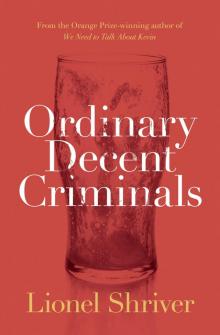 Ordinary Decent Criminals
Ordinary Decent Criminals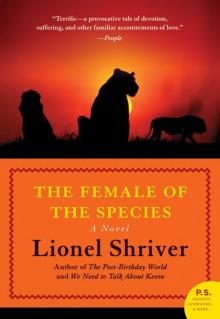 The Female of the Species
The Female of the Species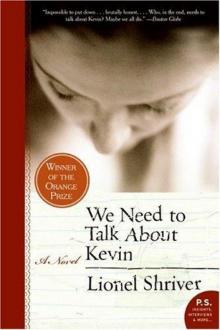 We Need to Talk About Kevin
We Need to Talk About Kevin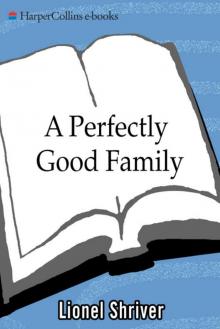 A Perfectly Good Family
A Perfectly Good Family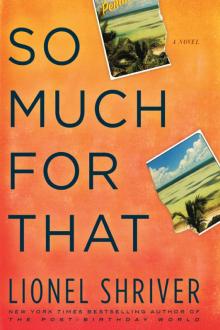 So Much for That
So Much for That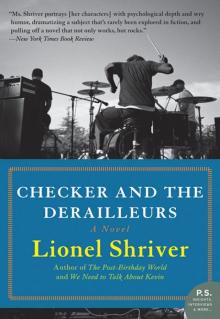 Checker and the Derailleurs
Checker and the Derailleurs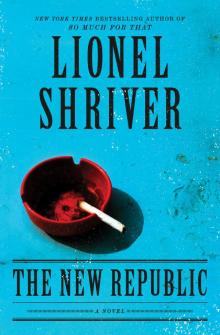 The New Republic
The New Republic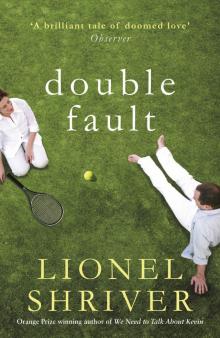 Double Fault
Double Fault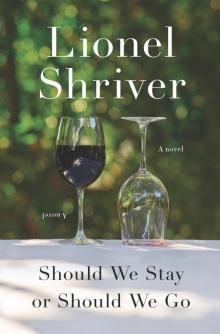 Should We Stay or Should We Go
Should We Stay or Should We Go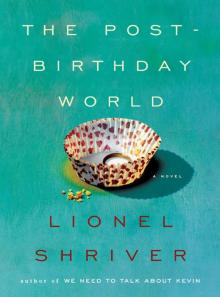 The Post-Birthday World
The Post-Birthday World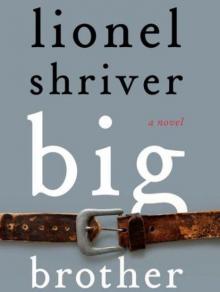 Big Brother
Big Brother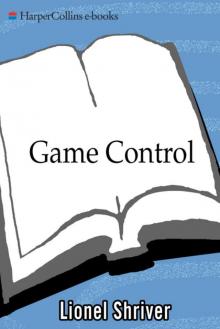 Game Control
Game Control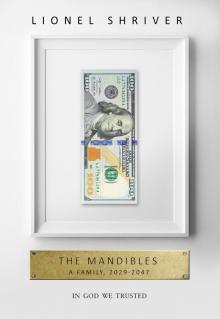 The Mandibles
The Mandibles The Standing Chandelier
The Standing Chandelier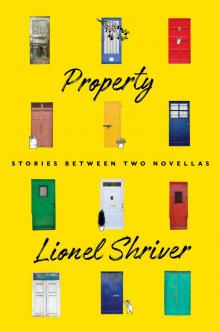 Property
Property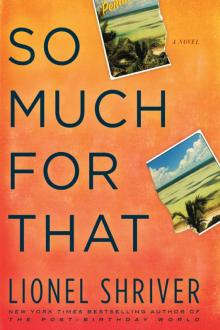 So Much for That: A Novel
So Much for That: A Novel